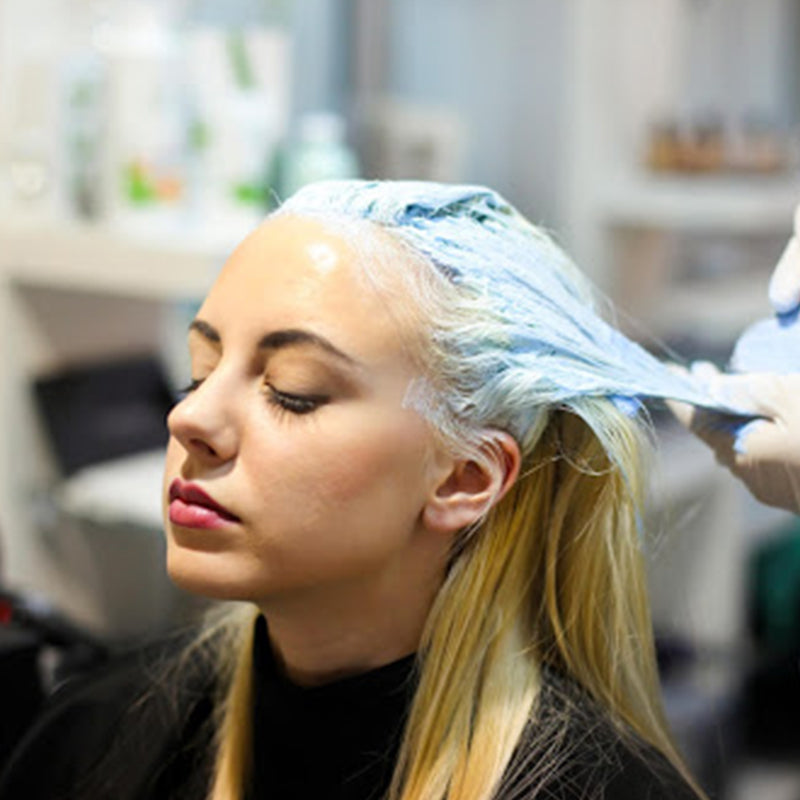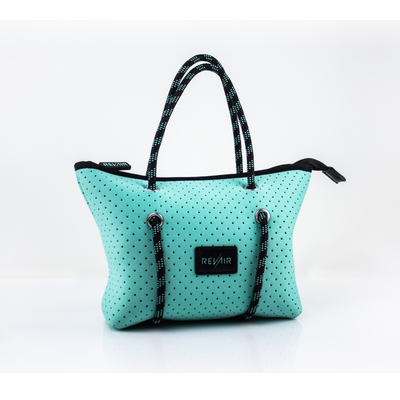
How To Dye Your Hair With Less Damage
Want the beautiful color you’ve always dreamed of without the damage?
We want to equip you with the proper knowledge about dying and highlighting your hair - and how to do it with minimal damage or risk to your hair.
The harmful effects of hair dye
So first things first, hair dye is a mix of strong chemicals. Chemicals and hair don’t sound like they would ever be the best of friends, so it is not surprising that frequently using them can damage your hair.
Dyes can include chemicals like:
- Ammonia
- Hydrogen peroxide
- Sensitizers like Paraphenylenediamine (PPDA)
These chemicals can dry your hair out or leave it brittle and prone to breakage, all the things we don’t want. These chemicals work together. Ammonia allows the dye to penetrate the shaft of your hair by swelling it and lifting hair cuticles, the protective plates that cover hair.
Hydrogen peroxide destroys your hair’s natural color, while also drying it out. The chemicals also strip away hair’s natural protective lipid layer, leaving it exposed to future damage and feeling rougher.
Although these chemicals can have harmful effects, like most things, they are okay in moderation, and there are even alternative methods.
Dyeing Your Hair Doesn’t Have to Leave Your Hair in Shambles
Dyeing or lightening your hair doesn’t have to be as taboo as it seems. The key to keeping your hair healthy when getting your hair dyed is to be educated and to use dye in moderation.
Patience is a virtue
When dying your hair you want to make sure that you are patient. Not everyone’s hair reacts to the chemicals in the same way, so one person may be able to lighten their hair in a couple hours while someone else may need a few sessions.
This all depends on your hair’s color and genetic makeup. But, generally, don’t expect to go from black to blonde in one sitting.
Don’t overdo it
Everyone wants the perfect color the first time they dye their hair, but like we said, everyone’s hair reacts differently, so that is not always possible. This is where the patience comes in.
You do not want to overdo it with the amount of chemicals you use in one sitting and with the amount of times you change your hair color in a short span of time. You should give your hair time to breathe and rebuild a little before you add more chemicals.
Quality is important
We can’t stress this enough.
When it comes to the hair dye that you are using, quality is extremely important. You only want the best for your hair, so the quality of your dye should be the best too.
Sorry, but grocery store box dye is a surefire way to cause damage to your hair. Try to go to a salon or find a quality, trusted, box dye.
Try to go to a salon or a trusted stylist
Going to a salon and finding a stylist who cares about the health of your hair is important. At a salon, you can have quality dye while also having someone who knows exactly what they are doing.
They know the ins and outs of dyeing hair and can save you the hassle of damaging your hair with quick at-home fixes.
Look into different types of dyes
Sometimes you don’t need something drastic or want to test the waters with dyeing your hair. Thankfully, there are many different kinds of hair dyes for your needs.
According to Loreal, here are some forms of hair dye:
Temporary hair dye - a.k.a wash out hair color. This dye coats only the outside of the hair shaft, the results don’t last. By the next time you shampoo your hair, the new color will wash out and you’ll be back to your natural shade without the worries of a major commitment.
Semi-permanent hair dye - these dyes are generally not formulated with ammonia and don’t require hair developer. Semi-permanent color generally lasts for around eight washes.
Demi-permanent hair dye - This type of hair dye is similar to semi-permanent hair dye due to the fact that it isn't permanent and is ammonia-free, but demi-permanent hair dye is mixed with a developer, which allows it to penetrate the hair shaft rather than simply coat it. Demi-permanent color generally lasts longer than the other types of hair dye that we talked about earlier.
Permanent hair dye - Permanent dye requires complex chemical processing and will penetrate your hair more deeply, meaning that your color can last for weeks without visible signs of fading. Permanent hair color can be used to help lighten, darken, or tone your hair and can help provide high gray hair coverage.
Highlights - Not everyone wants an all-over color, so this is where hair highlights come in. Highlights are achieved by placing the color on different segments of the hair to help promote depth, tone, and shade.
After figuring out the type of dye is best for your hair color goals, you should look into what techniques would be best for what you are looking for.
Find Your Perfect Hair Dye Technique
Dyeing your hair is all about expressing yourself in another way.
Highlights

Photo from @cooboard on IG
As we mentioned before, highlights is a selective hair lightening technique that refers to the process of using bleach to add lightness and dimension to parts of the hair. You can customize the number of highlights, where they are most concentrated, and how light you want to go.
Babylights

Photo from @evgenia_mitenina on IG
Babylights are similar to highlights but they are more subtle. The same lightening technique is used but to create a more natural look.
Balayage

Photo from @madd.hair on IG
Balayage is a hand-painted technique that is used to create a natural and gradual effect. It is meant to look effortless. This is becoming popular for curly and kinky/coily hair because it allows the stylist to highlight the curls where the sun naturally hits them.
Ombré

Photo from @hairbylindseyben on IG
Ombré is a bolder version of balayage. The hair is usually darker at the roots until the mid-lengths of the hair and then becomes lighter form the mid-length to the ends of the hair.
Take Care of Your New Color
Try colored hair products
Look for color shampoos and conditioners to help your color stay longer while also making sure your hair gets the moisture it needs (especially after dyeing it).
Avoid Heat Styling
I think we will take this aftercare tip to our graves! Anytime the health of your hair is the goal, you want to stay away from heat styling. In the case of dyeing your hair, heat styling can further the damage that hair dye will naturally cause. Being that your hair is in a reparative stage, you do not want to further the damage by introducing the breakage from heat styling.
Wash less frequently
Washing your hair frequently can strip your hair of the moisture it's craving after it’s dyed (and your color), so try to wash it only when necessary. Use only lukewarm water, since hot water opens the hair cuticle and allows pigment to seep out. Between washes, spritz roots with dry shampoo.
Condition frequently
The chemicals that are used to dye your hair are extremely drying and can make your hair brittle if you are not careful. To keep your hair healthy you need to give your hair moisture and perhaps more than your usual routine.
Try Hair Masks - Hair masks are a great way to add some extra moisture to your hair. You should try to find one that is moisturizing but also repairs your hair. They are simple and can be used weekly either for twenty minutes or even overnight. You can buy hair masks that are moisturizing or you can make your own at home.
Get your hair trimmed regularly
You should be getting your hair trimmed regularly to maintain healthy hair even - if you don’t dye your hair. Getting regular trims gets rid of any dead ends and chops off breakage to allow for healthy hair growth.
Avoid Chlorine
Chlorine strips your hair of moisture and that is the last thing you need when you used all these chemicals in your hair, but it also strips the hair of color. So try to stay clear of chlorine, especially when your hair is freshly colored.
Diet
Your diet makes a difference in how your hair feels and looks. Iron-rich foods and vitamin A are just some of the nutrients you should emphasize in your diet to ensure your colored hair is as healthy as possible.
To understand the full impact diet has on your hair and its health, read our Quick Tips to Keep Your Hair Happy & Healthy blog.
Give your hair the tools to be its best

Dyeing your hair may be something that you need or want and it doesn’t have to be the end of the hair you worked so hard to maintain.
You just have to make sure that you are educated enough about your hair and the process you are going to put it through before you leap over that ocean.
To help keep your hair healthy and make your color last longer, you should use the RevAir Reverse-Air Dryer. The RevAir smoothes the cuticles to help repair hair shafts and create smoother, shinier hair. From the RevAir’s smoothing power, the cuticle ends up being sealed which locks the color in your hair longer.
If you have any further questions about dyeing your hair, maintaining healthy hair, or anything else RevAir, please contact us. We love to chat with our customers!

















